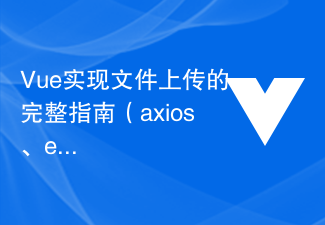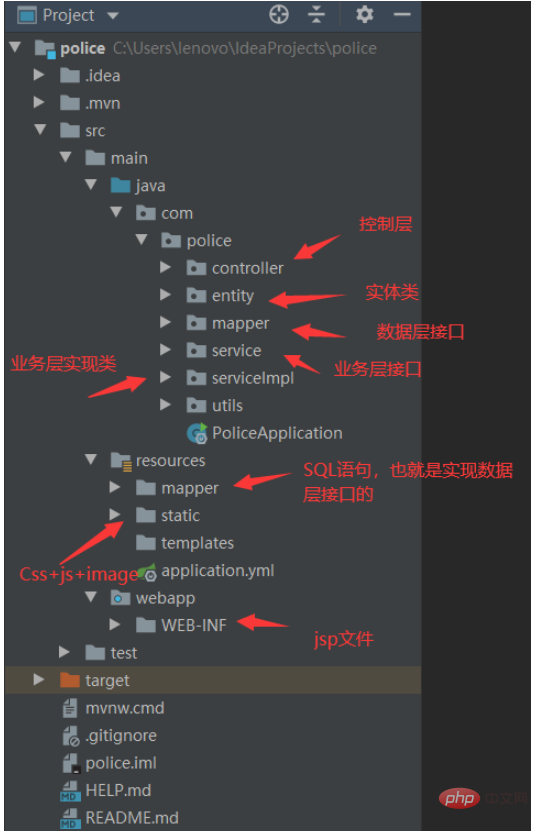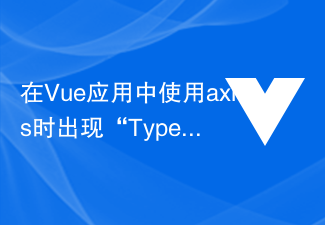This time I will bring you the 302 status code in axios. What are the precautions for using the 302 status code in axios? The following is a practical case, let's take a look.
For example, if the browser opens a single page (SPA) application, and the token (or session) expires after a while, after an Ajax request is initiated on the page, the backend returns a 302 status code and jumps to login page. I am using Vue axios and found that axios cannot intercept the 302 request. The following is the processing process.
Thinking
google axios 302 handle See two discussions on axios github
• https://github .com/axios/axios/issues/932
• https://github.com/axios/axios/issues/980
The conclusion is: the ajax request sent by the browser, The server returns a 302 status code, and the browser will jump on its own. We cannot directly obtain and customize the processing process through the js library (jquery, axios). We can only wait until the URL after the browser redirects to obtain the corresponding information.
axios sends ajax -->
server returns 302 and location -->
The browser requests a new url -->
The server returns 200 -- >axios Get results
So how to solve it? The server needs to cooperate to solve the problem.
Brower (ajax and not auth) -->
The server determines that it is an ajax request and is not logged in, returning a 401 status code-->
Browser axios intercepts 401 and jumps to /login through js
Solution
On the browser side, axios adds an interceptor
axios.interceptors.response.use((response) => {
return response;
}, function (error) {
if (401 === error.response.status) {
window.location = '/login';
} else {
return Promise.reject(error);
}
});
axios.defaults.headers.common['X-Requested-With'] = 'XMLHttpRequest';
Back-end code, using the flask framework, just look at the process, verify whether the request is ajax and not logged in, and then return the 401 status code
from flask import Blueprint, request, jsonify, make_response, abort
from flask_login.utils import current_user, current_app
apibp = Blueprint('api', 'api_bp')
# 主要逻辑
def bp_login_required():
if not current_user.is_authenticated:
if request.is_xhr:
abort(401)
else:
return current_app.login_manager.unauthorized()
apibp.before_request(bp_login_required)
@apibp.route("/report/domains/<month>/", methods=["GET"])
def monthly_domains(month):
return jsonify({})
ref</month>
I believe you have mastered the method after reading the case in this article. For more exciting content, please pay attention to other related articles on the php Chinese website!
Recommended reading:
How to use vue to request local json
JS operation JSON array deduplication
The above is the detailed content of 302 status code in axios. For more information, please follow other related articles on the PHP Chinese website!
 在Vue应用中使用axios时出现“Uncaught (in promise) Error: Request failed with status code 500”怎么办?Jun 24, 2023 pm 05:33 PM
在Vue应用中使用axios时出现“Uncaught (in promise) Error: Request failed with status code 500”怎么办?Jun 24, 2023 pm 05:33 PM在Vue应用中使用axios是十分常见的,axios是一种基于Promise的HTTP客户端,可以用于浏览器和Node.js。在开发过程中,有时会出现“Uncaught(inpromise)Error:Requestfailedwithstatuscode500”的错误提示,对于开发者来说,这个错误提示可能有些难以理解和解决。本文将会探讨这
 在Vue应用中使用axios时出现“TypeError: Failed to fetch”怎么办?Jun 24, 2023 pm 11:03 PM
在Vue应用中使用axios时出现“TypeError: Failed to fetch”怎么办?Jun 24, 2023 pm 11:03 PM最近,在使用Vue应用开发过程中,我遇到了一个常见的问题:“TypeError:Failedtofetch”错误提示。这个问题出现在使用axios进行HTTP请求时,后端服务器没有正确响应请求时发生。这种错误提示通常表明请求无法到达服务器,可能是由于网络原因或服务器未响应造成的。出现这个错误提示后,我们应该怎么办呢?以下是一些解决方法:检查网络连接由于
 在Vue应用中使用axios时出现“Error: Network Error”怎么解决?Jun 25, 2023 am 08:27 AM
在Vue应用中使用axios时出现“Error: Network Error”怎么解决?Jun 25, 2023 am 08:27 AM在Vue应用中使用axios时出现“Error:NetworkError”怎么解决?在Vue应用的开发中,我们经常会使用到axios进行API的请求或数据的获取,但是有时我们会遇到axios请求出现“Error:NetworkError”的情况,这时我们该怎么办呢?首先,需要了解“Error:NetworkError”是什么意思,它通常表示网络连
 Vue实现文件上传的完整指南(axios、element-ui)Jun 09, 2023 pm 04:12 PM
Vue实现文件上传的完整指南(axios、element-ui)Jun 09, 2023 pm 04:12 PMVue实现文件上传的完整指南(axios、element-ui)在现代Web应用程序中,文件上传已经成为一项基本的功能。无论是上传头像、图片、文档或者视频,我们都需要一个可靠的方法来将文件从用户的计算机上传到服务器中。本文将为您提供一份详细的指南,介绍如何使用Vue、axios和element-ui来实现文件上传。什么是axiosaxios是一个基于prom
 在Vue应用中使用axios时出现“Error: timeout of xxxms exceeded”怎么办?Jun 24, 2023 pm 03:27 PM
在Vue应用中使用axios时出现“Error: timeout of xxxms exceeded”怎么办?Jun 24, 2023 pm 03:27 PM在Vue应用中使用axios时出现“Error:timeoutofxxxmsexceeded”怎么办?随着互联网的快速发展,前端技术也在不断地更新迭代,Vue作为一种优秀的前端框架,近年来受到大家的欢迎。在Vue应用中,我们常常需要使用axios来进行网络请求,但是有时候会出现“Error:timeoutofxxxmsexceeded”的错误
 Java axios与spring前后端分离传参规范是什么May 03, 2023 pm 09:55 PM
Java axios与spring前后端分离传参规范是什么May 03, 2023 pm 09:55 PM一、@RequestParam注解对应的axios传参方法以下面的这段Springjava代码为例,接口使用POST协议,需要接受的参数分别是tsCode、indexCols、table。针对这个Spring的HTTP接口,axios该如何传参?有几种方法?我们来一一介绍。@PostMapping("/line")publicList
 axios和SpringBoot前端怎么调用后端接口进行数据交互May 13, 2023 am 10:34 AM
axios和SpringBoot前端怎么调用后端接口进行数据交互May 13, 2023 am 10:34 AM一、介绍一个完善的系统,前后端交互是必不可少的,这个过程可以分成下面几步:前端向后端发起请求后端接口接收前端的参数后,开始层层调用方法处理数据后端将最终数据返回给前端接口前端请求成功后,将数据渲染至界面二、项目结构前端技术:axios后端技术:SpringBoot(这个也无所谓,但是你一定要有控制层的访问路径,也就是所谓的请求地址对应的方法,可以用SSM框架,SSH框架,都可以)上面是大致的文件结构,相信大家后端的数据处理都没问题,无非就是:控制层接收前端请求,调用对应的业务层接口方法业务层实现
 在Vue应用中使用axios时出现“TypeError: bind is not a function”怎么办?Jun 25, 2023 am 08:31 AM
在Vue应用中使用axios时出现“TypeError: bind is not a function”怎么办?Jun 25, 2023 am 08:31 AM在Vue.js应用中,使用axios是非常常见的。Axios是一个强大的HTTP请求库,可以让你轻松发送异步HTTP请求。然而,在使用axios时,会遇到一些错误,其中之一就是“TypeError:bindisnotafunction”。这个错误通常是由于axios版本不兼容Vue.js的原因导致的。让我们来看一下这个错误的解决方法。首先,我们需要


Hot AI Tools

Undresser.AI Undress
AI-powered app for creating realistic nude photos

AI Clothes Remover
Online AI tool for removing clothes from photos.

Undress AI Tool
Undress images for free

Clothoff.io
AI clothes remover

AI Hentai Generator
Generate AI Hentai for free.

Hot Article

Hot Tools

Dreamweaver Mac version
Visual web development tools

VSCode Windows 64-bit Download
A free and powerful IDE editor launched by Microsoft

MinGW - Minimalist GNU for Windows
This project is in the process of being migrated to osdn.net/projects/mingw, you can continue to follow us there. MinGW: A native Windows port of the GNU Compiler Collection (GCC), freely distributable import libraries and header files for building native Windows applications; includes extensions to the MSVC runtime to support C99 functionality. All MinGW software can run on 64-bit Windows platforms.

PhpStorm Mac version
The latest (2018.2.1) professional PHP integrated development tool

SAP NetWeaver Server Adapter for Eclipse
Integrate Eclipse with SAP NetWeaver application server.






